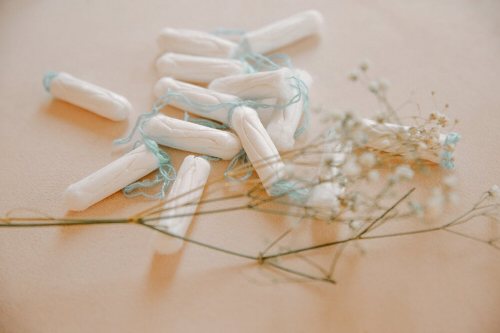Pad Women – The All-female Business Easing Period Poverty in Sri Lanka
“护垫女性”——这项女性事业缓解了斯里兰卡的经期贫困
Every month, Fathima Rifka used to suffer the embarrassment of rinsing out the rags she used during her period at a public tap – the only source of running water available in the poor Sri Lankan neighbourhood she grew up in.
每月,Fathima Rifka都会因在公共水龙头上洗她经期用过的垫布而感到尴尬,但在她生活的这个贫穷的斯里兰卡社区,这个公共水龙头是唯一的活水来源。
“You have to stand in line, and then you also have to wash our utensils from the previous day. There is only one source of water and everyone is there,” said the 24-year-old.
这位24岁的年轻人说:“你必须排队,然后还必须清洗前一天的餐具。那是唯一的水源,所有人都在那里。”
“We hide it and dry it. But sometimes it doesn’t dry properly and the cloth is stiff.”
“我们把它藏起来并晾干。但是有时候晾干的方式不对,布会很硬。”
All that changed a year ago when Rifka got her first job making low-cost, organic sanitary towels – something she now teaches other women in her Colombo neighbourhood of Kithulwatte to do.
一年前,Rifka获得了一份生产低成本有机卫生巾的工作,让这一切发生了变化——她现在教科伦坡Kithulwatte社区的其他女性做这件事。
The business was inspired by Arunachalam Muruganantham, an Indian inventor who developed a way of making cheap pads after watching his wife struggle with rags during her period – the subject of the 2018 Bollywood hit “Pad Man”.
该业务的灵感来自印度发明家Arunachalam Muruganantham,他看到妻子在经期使用垫布很不方便,就开发了一种制作廉价卫生巾的方法——他是2018年宝莱坞影片《印度合伙人》(Pad Man)的原型。
At 60 Sri Lankan rupees (35 cents) for a packet, demand for the product, which goes by the name Sinidu meaning soft, is growing.
每包卫生巾的价格是60斯里兰卡卢比(合35美分),该产品的名称为Sinidu,意思是“柔软”,其需求正在增长。
Commercially produced towels typically sell for between 100 and 140 rupees, putting them out of reach of most Sri Lankan women. Imported brands can cost up to 500 rupees.
商业生产的毛巾通常售价在100到140卢比之间,使大多数斯里兰卡女性望而却步。进口品牌的价格可能高达500卢比。
The women behind Sinidu first started manufacturing in Sri Lanka in January 2018 – the day of the “Pad Man” premiere and set up their first full-fledged factory a year later in Kithulwatte.
Sinidu的女士们于2018年1月,即《印度合伙人》首映日,首先在斯里兰卡开始生产,并于一年后在Kithulwatte成立了她们的第一家成熟工厂。
They import the wood pulp that Muruganantham developed to make the pads from India, using his design for the simple machines they manufacture on.
她们从印度进口Muruganantham开发的木浆,利用他的设计在简单的机器上制造卫生巾。
Rifka and her colleagues can take what they need and sell the rest, pocketing 15 rupees per packet.
Rifka和她的同事可以拿走她们需要的卫生巾,然后出售其余的,每包15卢比。
The operation – a social enterprise, or business with a social as well as a commercial aim – was started by the SAARC Chamber Women Entrepreneurs Council (SCWEC), which works to help women in South Asia access business opportunities.
这是一家社会企业,即既有社会目标又有商业目标的企业。它由南盟商会女企业家理事会(SCWEC)发起,该理事会致力于帮助南亚妇女获得商机。
They have just introduced the machines in a prison, where female inmates will be able to make their own pads, and plan to expand the operation to other communities in Sri Lanka, and eventually to Nepal and Bangladesh.
她们将这些机器引入了一所监狱,女囚犯能够制造自己的护垫。她们还计划将这种经营扩大到斯里兰卡的其他社区,最后扩大到尼泊尔和孟加拉国。

Stigma
羞辱
Period poverty has hit global headlines in recent years, with statistics showing that even in a wealthy Western country like Britain, one in 10 girls have been unable to afford sanitary products.
近年来,经期贫困一直是全球头条新闻。统计数据显示,即使在像英国这样的富裕西方国家,还有十分之一的女孩负担不起卫生用品。
This year Meghan Markle became the first British royal to speak out on the once taboo issue, saying girls were missing school “because no one wants to talk about it or has what they need”.
今年,Meghan Markle成为第一位在曾经的禁忌问题上发出呼吁的英国皇室成员,称女孩失学“是因为没人愿意谈论这个问题,也没有提供她们所需要的东西”。
In Sri Lanka, the problem is particularly acute because sanitary products are so heavily taxed – until last September, the levy on imported pads was more than 100 percent.
在斯里兰卡,这个问题尤为严重,因为卫生用品的税收非常高——直到2018年9月,对进口卫生巾的征税超过100%。
It has since been reduced to about 63 percent and Sri Lanka’s finance minister, Mangala Samaraweera, told the Thomson Reuters Foundation he was looking into how taxes on sanitary products could be reduced further.
此后,这一税率已降至约63%,斯里兰卡财政部长Mangala Samaraweera告诉路透基金会,他正在研究如何进一步降低卫生产品税。
“Access to affordable female hygiene products is certainly expected to have an important positive impact on girls’ school attendance and thus educational outcomes,” he said.
他说:“获得负担得起的女性卫生用品一定会对女孩的课堂出勤率和教育成果产生重要的积极影响。”
“It will also facilitate fuller participation of women in the economy.”
“这还将促进女性更充分地参与经济发展。”
But Anuki Premachandra, head of research communication at The Advocata Institute, an independent policy think tank, said the issue still wasn’t being given the importance it deserved.
但是独立政策智囊机构阿德瓦卡塔研究所(The Advocata Institute)研究传播负责人Anuki Premachandra表示,这个问题仍然没有得到应有的重视。
“People are enraged about the cost of carrots, but when it comes to taxes on sanitary napkins, they dismiss it as a women’s issue,” she said.
她说:“人们会对胡萝卜的价格感到愤怒不满,但在卫生巾的税收方面,他们认为这是女性的问题。”
Last year New Delhi abolished the sales tax on sanitary products although other South Asian countries still tax them.
去年,新德里取消了卫生产品的营业税,但其他南亚国家仍对其征税。
But for women in the region, the problems go beyond cost.
但是对于该地区的女性来说,问题不仅仅在于成本。
In parts of India and Nepal, cultural taboos mean menstruating women and girls are banished from their homes at night, putting them at risk. Several have died in Nepal in recent years.
在印度和尼泊尔的部分地区,文化禁忌意味着经期的妇女和女孩在晚上被驱逐出家,被置于危险之中。近年来,有几人在尼泊尔死亡。
One in three girls in South Asia miss school during their periods and in Sri Lanka, the figure is even higher.
在南亚,三分之一的女孩在经期失学,而在斯里兰卡,这一数字甚至更高。
A 2015 survey of adolescent Sri Lankan girls conducted by the United Nations children’s agency UNICEF and the government found more than half had to miss school when they had their period.
联合国儿童基金会和斯里兰卡政府在2015年对该国女孩进行了调查,结果发现,超过一半的人在经期不得不失学。
Another U.N. study found 60 percent of teachers in Sri Lanka thought menstrual blood was impure.
联合国的另一项研究发现,斯里兰卡60%的教师认为经血是不纯洁的。
“Women complain about rashes when using the normal pads. Some have other illnesses related to periods, but there is a lot of stigma. So it’s a challenge and we don’t speak about it,” said Rifka, who sold 100 packets this month.
Rifka本月售出了100包卫生巾,她说:“女性抱怨使用普通垫布时会出现皮疹。有些人还患有其他与经期有关的疾病,但羞辱之声很多。所以这是一项挑战,我们不会谈论这个问题。”
“I have already started selling these pads and there is a lot of demand. Many women come back to me and tell me how good it was. They all want to buy more.”
“我已经开始销售这些护垫了,需求量很大。许多女性购买之后回来找我,告诉我它有多好用。她们都想再多买些。”
英文、中文版本下载:http://www.yingyushijie.com/shop/source/detail/id/2445.html








